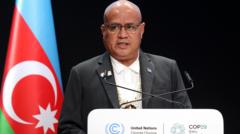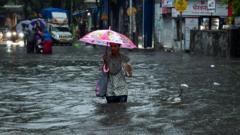Tuvalu enhances financial accessibility with the installation of its first cash machines, marking a monumental shift towards electronic banking for its residents.
Tuvalu Introduces First Cash Machines in Historic Banking Evolution

Tuvalu Introduces First Cash Machines in Historic Banking Evolution
Pacific Island Nation Celebrates Access to Modern Banking for First Time
The tiny Pacific island nation of Tuvalu has marked a significant milestone by unveiling its first cash machines in a ceremony hailed as historic by Prime Minister Feleti Teo. This transformative step is a game-changer for the country’s 11,000 residents, who now gain access to electronic banking for the very first time.
Five cash machines and 30 sales terminals have been installed in Funafuti, the main island, including at the local airport. "This moment not only symbolizes a major occasion but ushers in a new era for our banking system," Teo declared. "We’ve been stuck in an analogue phase; this access was once just a dream for us."
The installation ceremony at the National Bank of Tuvalu's headquarters in Vaiaku was attended by traditional leaders, members of parliament, and business representatives. Historically, Tuvaluans have faced long queues at banks to withdraw salaries, a situation that will improve with the introduction of cash machines. Now, local shops will also have the ability to accept electronic payments.
Initially, the cash machines will only support prepaid cards; however, there are plans to expand services to include internationally recognized debit and credit cards in the future. Head of the National Bank, Siose Penitala Teo, emphasized that this shift towards electronic banking would significantly empower the local economy.
Tuvalu, an archipelago of nine low-lying islands in the South Pacific that gained independence from the UK in 1978, faces severe threats from climate change. With all islands barely rising above 4.5 meters above sea level, local legislators have been vocal about the looming threat of rising sea levels potentially engulfing their homeland. Teo highlighted these concerns during his address at the COP29 Climate Conference in Azerbaijan, warning that without action, Tuvalu may one day cease to exist.
Five cash machines and 30 sales terminals have been installed in Funafuti, the main island, including at the local airport. "This moment not only symbolizes a major occasion but ushers in a new era for our banking system," Teo declared. "We’ve been stuck in an analogue phase; this access was once just a dream for us."
The installation ceremony at the National Bank of Tuvalu's headquarters in Vaiaku was attended by traditional leaders, members of parliament, and business representatives. Historically, Tuvaluans have faced long queues at banks to withdraw salaries, a situation that will improve with the introduction of cash machines. Now, local shops will also have the ability to accept electronic payments.
Initially, the cash machines will only support prepaid cards; however, there are plans to expand services to include internationally recognized debit and credit cards in the future. Head of the National Bank, Siose Penitala Teo, emphasized that this shift towards electronic banking would significantly empower the local economy.
Tuvalu, an archipelago of nine low-lying islands in the South Pacific that gained independence from the UK in 1978, faces severe threats from climate change. With all islands barely rising above 4.5 meters above sea level, local legislators have been vocal about the looming threat of rising sea levels potentially engulfing their homeland. Teo highlighted these concerns during his address at the COP29 Climate Conference in Azerbaijan, warning that without action, Tuvalu may one day cease to exist.




















